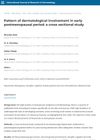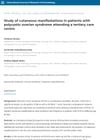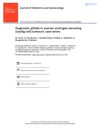 November 2024 in “Frontiers in Endocrinology”
November 2024 in “Frontiers in Endocrinology” Hair analysis can help diagnose adrenal disorders non-invasively.
April 2024 in “Tạp chí Y học Thảm hoạ và Bỏng” Choosing the right treatment for hair loss is complex and depends on effectiveness, side effects, practicality, and cost.
January 2024 in “Cosmetics” Menopause worsens skin, hair, and nails, affecting self-esteem and quality of life.
 October 2023 in “IntechOpen eBooks”
October 2023 in “IntechOpen eBooks” Genes and epigenetic changes are important in the development of Polycystic Ovary Syndrome.
 September 2023 in “International Journal of Dermatology”
September 2023 in “International Journal of Dermatology” Younger people are at a higher risk for Fibrosing Alopecia in a Pattern Distribution than previously thought, with common symptoms and possible involvement of mast cells in its development.
 May 2023 in “Journal of the Dermatology Nurses' Association”
May 2023 in “Journal of the Dermatology Nurses' Association” The DNA convention was a valuable opportunity for learning and networking, especially after COVID-19.
 November 2022 in “The Journal of Clinical Endocrinology and Metabolism”
November 2022 in “The Journal of Clinical Endocrinology and Metabolism” Postmenopausal hyperandrogenism, a condition with symptoms like increased hair growth and acne, is usually caused by PCOS but can also be due to other factors. It's diagnosed by checking testosterone levels and treated either by removing the adrenal tumor or through antiandrogen therapy.
 September 2022 in “Women's healthcare”
September 2022 in “Women's healthcare” PCOS is managed by lifestyle changes and personalized medication to improve symptoms and fertility.
 June 2020 in “International Journal of Research in Dermatology”
June 2020 in “International Journal of Research in Dermatology” Early postmenopausal women often experience skin issues like vaginal dryness, swallowing difficulties, hair loss, and uncommonly, keratoderma and hirsutism, but many are unaware these are related to menopause.
 July 2019 in “International Journal of Research in Dermatology”
July 2019 in “International Journal of Research in Dermatology” Women with PCOS often have acne, obesity, and excess hair, especially on the chin and upper lip.
 August 2024 in “Archives of Women s Mental Health”
August 2024 in “Archives of Women s Mental Health” Women with PCOS have more depression and stress due to high androgen levels, not obesity or insulin resistance.
January 2023 in “Frontiers in Medicine” ALRV5XR is the most effective hair regrowth treatment at 24 weeks.
April 2020 in “International journal of reproduction, contraception, obstetrics and gynecology” A postmenopausal woman with hair loss and hirsutism improved after surgery to remove an ovarian tumor.
3 citations,
October 2015 in “EFSA supporting publications” Isoflavones may help with menopause symptoms but could be risky for women with hormone-sensitive cancers.

Preparing and learning about menopause can improve women's quality of life as they approach this phase.
 21 citations,
April 2019 in “Clinical, cosmetic and investigational dermatology”
21 citations,
April 2019 in “Clinical, cosmetic and investigational dermatology” The document concludes that stopping shaving or removing affected hair can alleviate Pseudofolliculitis barbae (PFB).
 December 2020 in “Current Sexual Health Reports”
December 2020 in “Current Sexual Health Reports” Finasteride can have lasting negative effects on brain function and behavior by disrupting neurosteroid production.
 15 citations,
December 2017 in “Journal of The European Academy of Dermatology and Venereology”
15 citations,
December 2017 in “Journal of The European Academy of Dermatology and Venereology” Frontal fibrosing alopecia and androgenetic alopecia may be related, with a possible shared cause.
 10 citations,
January 2014 in “Journal of Mid-life Health”
10 citations,
January 2014 in “Journal of Mid-life Health” Menopause can cause skin issues, and seeing a dermatologist helps.
 150 citations,
April 2013 in “Dermato-endocrinology”
150 citations,
April 2013 in “Dermato-endocrinology” Estrogen therapy can reduce skin aging but has cancer risks.
 120 citations,
June 2008 in “American Journal of Epidemiology”
120 citations,
June 2008 in “American Journal of Epidemiology” A simple screening method found that 6.3% of women in a semiurban area in Sri Lanka have polycystic ovary syndrome, with most showing menstrual irregularities.
 31 citations,
May 2012 in “European Journal of Dermatology”
31 citations,
May 2012 in “European Journal of Dermatology” Menopause affects hair and skin; more research needed for treatment.
 27 citations,
May 2016 in “Dermatologic Surgery”
27 citations,
May 2016 in “Dermatologic Surgery” Male faces age with more wrinkles and hair loss, influenced by both body changes and environmental factors.
 24 citations,
September 2001 in “Journal of The American Academy of Dermatology”
24 citations,
September 2001 in “Journal of The American Academy of Dermatology” Women's ovarian hormones and adrenal androgens change throughout life, affecting hair loss and health.
 23 citations,
October 2018 in “Australasian Journal of Dermatology”
23 citations,
October 2018 in “Australasian Journal of Dermatology” The current understanding of frontal fibrosing alopecia involves immune, genetic, hormonal factors, and possibly environmental triggers, but more research is needed for effective treatments.
 22 citations,
February 2014 in “Arquivos Brasileiros De Endocrinologia E Metabologia”
22 citations,
February 2014 in “Arquivos Brasileiros De Endocrinologia E Metabologia” An 81-year-old woman's severe male hormone symptoms were caused by an ovarian tumor, which was treated with surgery.
 12 citations,
March 2018 in “Medicine”
12 citations,
March 2018 in “Medicine” A postmenopausal woman's hirsutism and high testosterone levels improved after surgery for an ovarian tumor not seen on ultrasound.
 8 citations,
July 2020 in “Journal of The American Academy of Dermatology”
8 citations,
July 2020 in “Journal of The American Academy of Dermatology” Patients with Lichen Planopilaris are more likely to have rosacea and skin cancer but less likely to have congestive heart failure, stroke, and glaucoma.
 8 citations,
February 2017 in “Clinical Drug Investigation”
8 citations,
February 2017 in “Clinical Drug Investigation” Finasteride can cause sexual dysfunction and depression, which may persist and require hormonal treatment.
 5 citations,
November 2018 in “Journal of Obstetrics and Gynaecology”
5 citations,
November 2018 in “Journal of Obstetrics and Gynaecology” Ovarian Leydig cell tumors are hard to diagnose with just advanced imaging; expert ultrasound and clinical evaluation are essential.

























